Threats, attacks, destruction of newsrooms — how Russia targets Ukrainian media from frontline regions
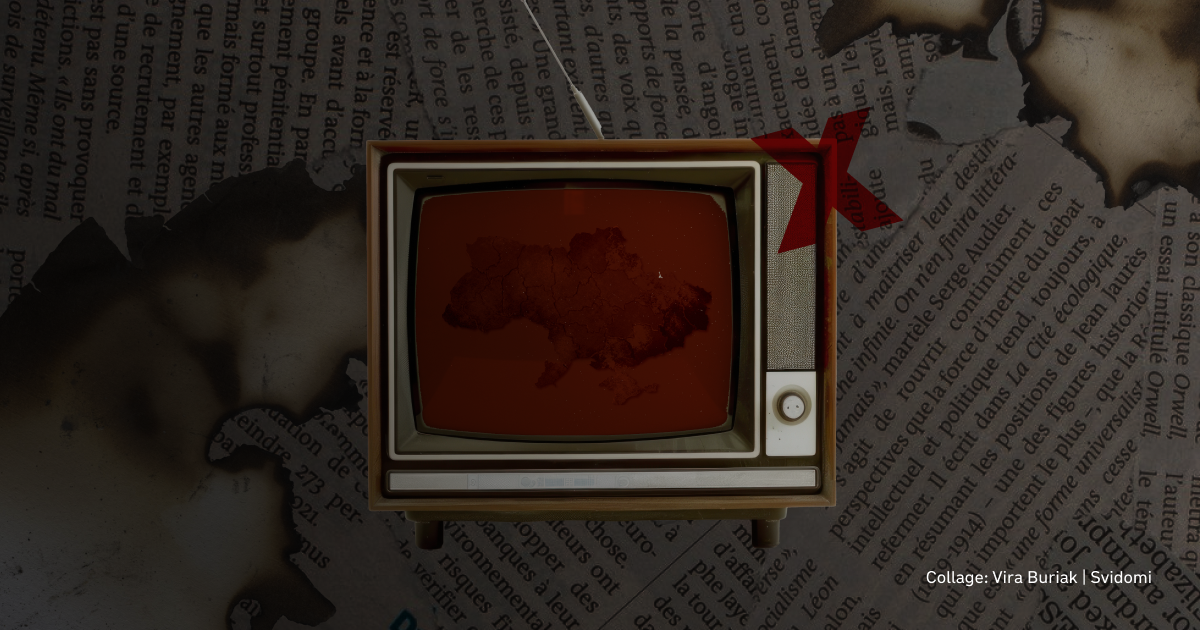
Since the start of the war against Ukraine in 2014, Russia has been arresting, threatening and killing journalists. At least 91 media professionals have been killed and 32 journalists detained since the start of the full-scale invasion in February 2022.
Ukrainian media have been subjected to DDoS attacks, social media threats and raids on offices and communications infrastructure. Regional media in the Donetsk, Luhansk, Kharkiv, Zaporizhzhia and Kherson regions are particularly at risk, as they operate in areas that Russia is already trying to occupy.
Representatives of Ukrainian regional media told Svidomi how Russia targets them via bots and spam wherever it can and how they counteract it, often alone.
They called us 'cannibal radio' — how Radio Nakypilo counters Russian propaganda in the Kharkiv region
In December 2022, Radio Nakypilo began broadcasting on FM frequencies in Kharkiv, jamming the Russian propaganda station ZhiZn. Radio Nakypilo's editor-in-chief, Yevhen Streltsov, says this was one of the team's goals.
"They said that Ukraine does not exist and that the Ukrainian army should surrender. That was one of our goals. We jammed their signal. Since then, Russian propagandists have been following what we are doing, calling on military units of the Russian army to jam us in some way on social media. Among other things, they called us 'cannibal radio'," says Yevhen about the work of Russian propagandists targeting Radio Nakypilo.
The Russians are also launching distributed denial-of-service (DDoS) attacks (overwhelming the target with a flood of internet traffic to make it inaccessible to users — ed). Yevhen says the site's servers are located abroad, so they have not yet been able to take it down. But this affects the statistics on the site itself.
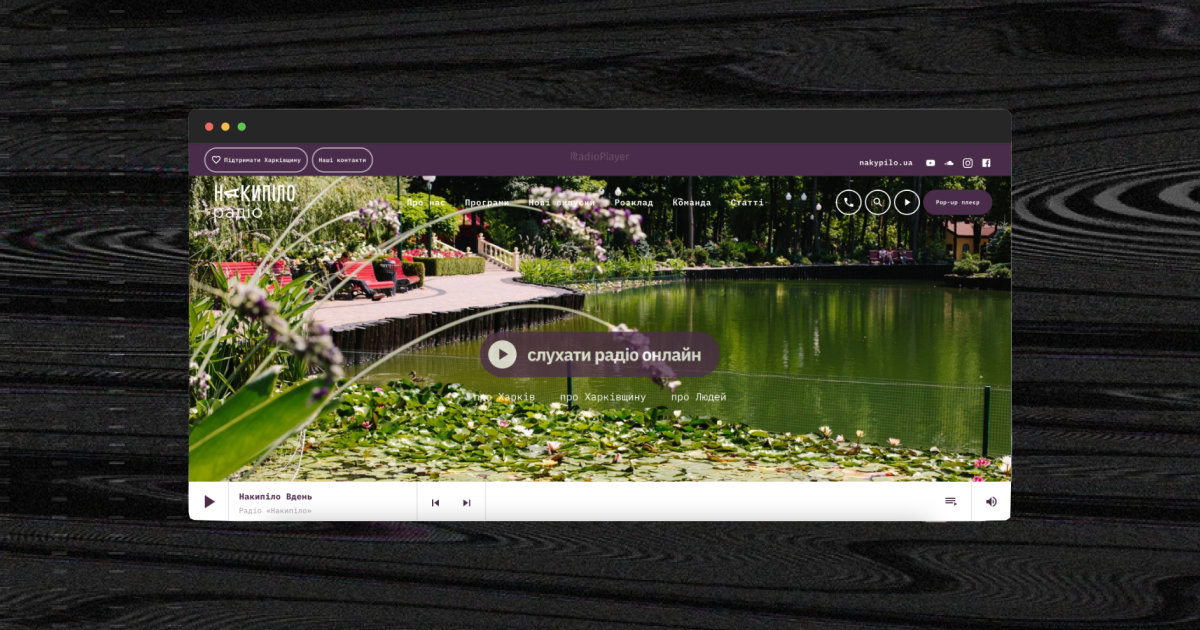
Russia is also actively using double-tap tactics across Ukraine, including in the Kharkiv region. They repeatedly target airstrike sites to injure and kill rescuers, police and paramedics who came to save civilians. In this way, the Russians are trying to kill those who have come to save people and gather information about Russian war crimes. Journalists also fall under a double tap while working on the ground. In April, Viktor Pichuhin, a colleague of Yevhen Streltsov's Nakypilo Media Group, suffered a blast injury during a repeated attack on an apartment building in Kharkiv. He arrived at the scene of the attack, where medics and rescuers were already present. Four people were killed and 12 wounded as a result.
"The Russians like to use this tactic in the Kharkiv region," says Yevhen of the risks journalists face from regular Russian shelling in frontline areas. Viktor was treated after the attack and now feels better.
Yevhen also tells the story of his colleagues from Slobozhanske FM Radio. During the occupation of Velykyi Burluk in the Kupiansk district, Russians stole the radio's equipment, access to the frequency, and the radio's branded intros. Now, they are using the access to spread their propaganda under the brand name Slobozhanske FM. The editorial office appealed to law enforcement but was unable to restore access to the frequencies.

"The Russians broadcast in Ukrainian. This means they are trying to convey their messages in every possible way to those residents of the frontline territories of the Kharkiv region who are hesitant and do not have a clear picture of what is happening. This does not mean that the residents are separatists, but that in this information confrontation, people sometimes struggle to find their way, to confirm their position, to understand what is going on. This is the way it is,"
says Yevhen.
Mykhailo Zubarenko, director of the Slobozhanske FM radio station, says that after the Kharkiv region was de-occupied in 2022, the radio was able to resume broadcasting in Balakliia, Barvinkove, Zmiiv, and Blyzniuky. To jam the fake broadcasting of Russian propagandists on the frequency that belonged to Slobozhanske FM, the radio station applied to the National Council for a temporary broadcasting permit. Now, they are using a different frequency in Kharkiv.
Nevertheless, the regional media are left to deal with Russia on their own. The Russians target and harass Ukrainian journalists and collect data on them. Yevhen Streltsov believes that the first step is to raise awareness.
"We need to talk on all platforms about Russia’s terrorist methods against journalists, against the media. This is an information war. There is still resistance in the regions, and it is important for the Russians to attack us. That is why they are using all the means of propaganda and falsification in order to win over at least part of the population in the frontline areas or even in the occupied territories. Let me give you an example of radio. Yes, the situation with radio stations has improved. Now the signals of Russian propaganda stations have been jammed in the Kharkiv region, but at the end of 2023 you could hear more than 10 Russian stations," he says of the importance of both community and state support for regional media.
"They made a special report on the elimination of the local radio station," how Vilne Radio continues to work for the Donetsk region after the occupation and destruction of Bakhmut.
Vilne (Free) Radio is an independent regional media outlet in the Donetsk region, which has been operating in Bakhmut since 2017. In August 2022, the Russian military destroyed the radio station's office in Bakhmut. It was a deliberate attack.
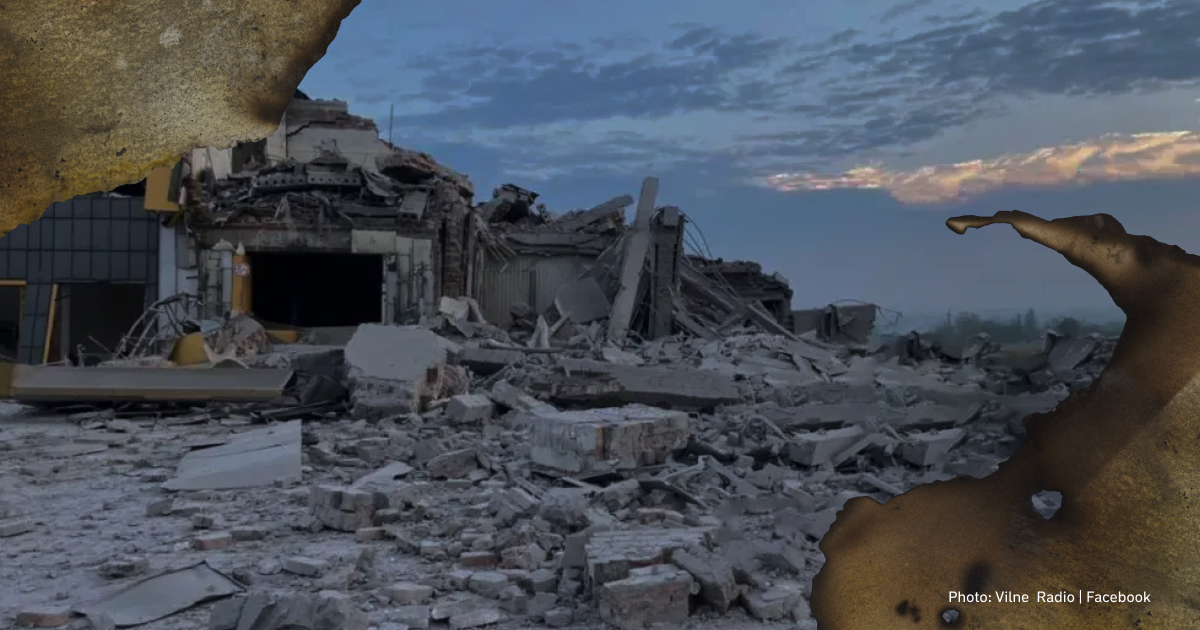
'The Russians made a special report about the elimination of the local radio station, and now they won't talk about pro-Ukrainian movements here,' says Anna Serdiuk, editor-in-chief of Vilne Radio.
The Russians are doing their best to cause damage to Vilne Radio's website using a variety of methods.
"In some materials, they referred to us as a source. And in others, they spread propaganda. We had to disable these links in Google just to avoid being listed next to Russian propaganda. They also tried to back up their lies by showing that they were referring to legitimate sources," says Anna, explaining the methods used by the Russians to undermine the work of the media.
Bots and simply unhappy people spam comments under videos on Vilne Radio's TikTok account. Anna says it's all down to the social network's algorithms.
"It displays videos on a geographical basis. So there are a lot of Russians and people from the occupation in our comments. I don't know what the percentage of bots is, I think it's certain, but some people have just come sincerely to vent their anger, their dissatisfaction and to find a scapegoat to define their existence," she says.
However, the main problem for Vilne Radio remains the Russian blocking of FM frequencies. They are destroying the infrastructure in the Donetsk region, making it harder for the radio to get through to both the occupied and frontline areas.

"The Russians are jamming every Ukrainian radio station to put a kind of Russia-1 there. They try to jam all the regional media that are particularly active in those areas. It's the same as when Radio Nakypilo was jammed in the Kupiansk district during the occupation. It's a planned thing, going back to the USSR's instruction manuals, that the radio station should be jammed so that there is no access to information,'
says Anna.
Radio is the last source of information for people in the temporarily occupied territories, says Anna Serdyuk. The Russians are demolishing mobile phone masts and destroying internet infrastructure. By jamming the radio signal and replacing it with their own broadcasts, they are spreading their propaganda in the temporarily occupied territories. They are manipulating Ukrainians who remain in danger there.
In Avdiivka, all the radio stations were jammed, and then those who hid their children until the last moment, when they left for Russia, told Russian journalists, "We heard that children are used there for organ donation, so we didn't give the children to the police", this is also the influence of radio because these people got the only signal available", Anna tells how Russia uses radio to spread propaganda and intimidate Ukrainians in the occupied and frontline areas.
The state should invest in frequency infrastructure and make it easier for radio stations to obtain licences for Vilne Radio to counter this, says Anna.
"Unfortunately, the restoration of radio towers is not a priority. I know from Kherson that it took more than six months after the occupation to restore Ukrainian broadcasting there. This is a big problem in the Kharkiv region. It is also possible to issue licences before the occupation. We cannot start broadcasting without a licence. For example, we have a tower that is intact, but we cannot do anything without a licence. The procedure involves a tender," says the editor-in-chief, explaining the demands that Vilne Radio employees have been making on the state.
Currently, Vilne Radio broadcasts on two frequencies. One from Bakhmut and the other from Hirnyk. There is currently no transmission on 91.5 FM, as the tower in the burnt-out town has also collapsed. Work is continuing on 106.0 FM: there is a rebroadcast of Ukrainian Radio, episodes of the Donbas Realities project and some unique content from the Vilne Radio team. Vilne Radio journalists are in danger because the Russians definitely have data on all of them, Anna believes.
Vilne Radio used to be the only local radio station in Bakhmut. In the Donetsk region, there were up to 10 Ukrainian radio stations, Anna says. That's because even after the war broke out in 2014, Ukraine didn't add towers to spread the signal in the Donetsk region.

"We had to look for tools to counter disinformation. There is no equipment in many places, even for Ukrainian Radio, the state broadcaster. For now, at least, it's good that we still have a radio wave in Bakhmut. If all goes well, it will stay with us until we can broadcast there. If they don't take it away. From time to time, we have to show the office where we are registered, show that we exist, we are not a fiction, to confirm to the state. We really want to work here, just let us,"
says Anna Serdiuk.
"Russians hacked our telegram account and stole our main channel and the chat with subscribers": how RIA-Melitopol/RIA-Pivden face threats for their work in the Zaporizhzhia region
On August 20, 2023, the Russians detained Heorhii Levchenko, the admin of the RIA-Melitopol telegram channels, in the temporarily occupied city of Melitopol. In October, the Russians released a video about Levchenko on the propaganda channel Russia 1. They accused him of 'publicly calling for terrorist attacks'. Levchenko faced up to 20 years in prison. As of July 2024, he remains in custody.
Denys (name changed at the request of the media employee — ed.), a representative of RIA-Melitopol/RIA-Pivden, talks about the abduction of Heorhii Levchenko and the loss of the media telegram channel.
"Only a month later, the Russians published a video with our Heorhii, so we decided to tell how the Russian special services gained access to the Telegram channel. They simply kidnapped a man, confiscated his phone, logged into the account of our RIA-Melitopol channel and stole our main channel and the chat with subscribers. We had to create a new channel. The day before, we created a new logo and the name 'RIA-Pivden'," says Denys, explaining how the editorial team reacted to the kidnapping of the admin and the TG channel.
After the Russians stole the channel, they removed all Ukrainian information from it and launched their own propaganda.
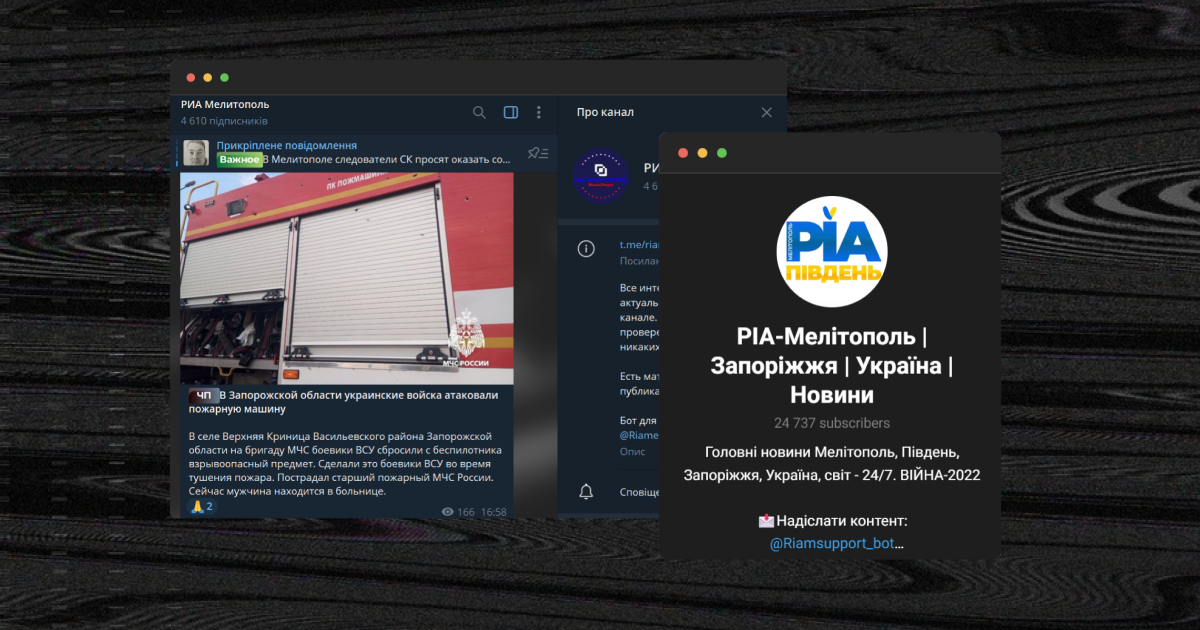
They tried to mislead our readers, but nobody believed them. At the moment this hacked telegram channel RIA-Melitopol has 5,000 subscribers, no more,' says Denys.
People heard the media's appeal and massively unsubscribed from the channel stolen by Russia. Previously, the channel had 79,000 subscribers. By July 2024, it had only four thousand subscribers.
The Russians threaten the media of the Ukrainian RIA-Melitopol/RIA-Pivden. They send letters to the media's email, and Russian bots and trolls spam comments on social media. Denys says the Security Service of Ukraine has even intervened.
"The Russians are sending threats — if we continue our activities, we will face life imprisonment, we will all be tracked down, and so on. This is the mental harassment of the team. Thanks to the Security Service of Ukraine, we managed to expose one of the commentators. It turned out that he lived in Dnipro and worked for Russia as a bot on several Ukrainian resources. He was posting comments on orders from Russia. He threatened our journalists, called on people in the occupied territories to cooperate with Russia and glorified Russia."
In April 2024, Russian propaganda channels made a post on Telegram to journalists from RIA-Melitopol/RIA-Pivden, demanding their surrender. They specifically targeted those still in the temporarily occupied city of Melitopol. The Russian propagandists called on the journalists to "come to the central square of Melitopol and surrender", "promising" them jobs in Russian media and "decent" salaries in return.
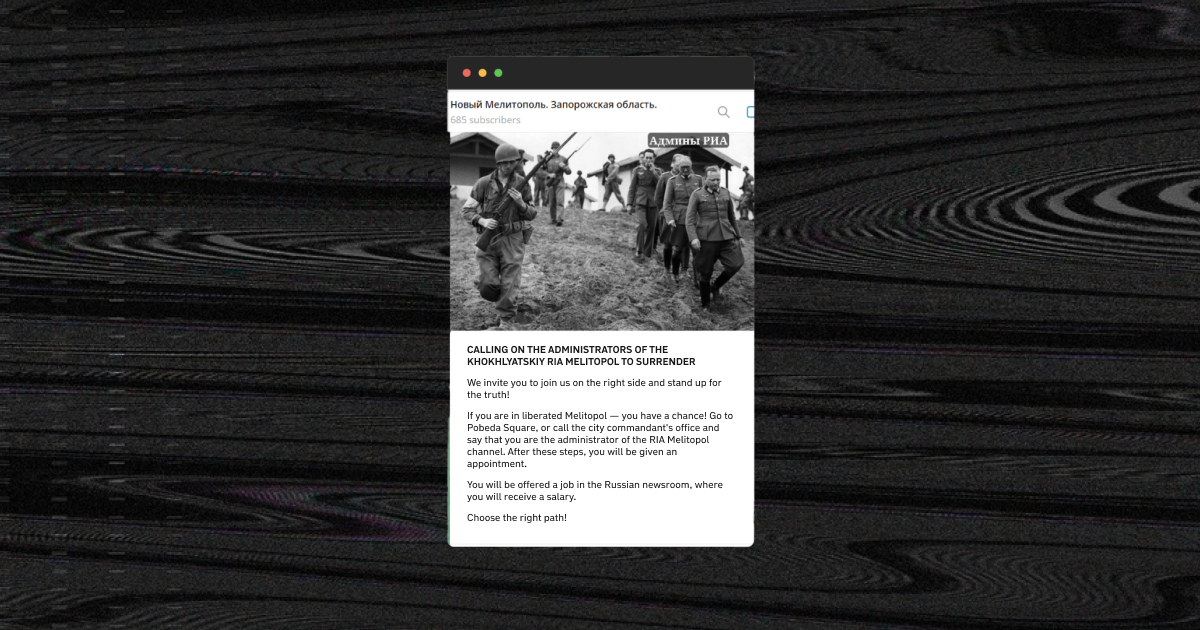
Such threats appear regularly on TG propaganda channels.
"This was also the case after the 'strikes' on the airfield with Russian military equipment (on July 8, 2024, the Ukrainian Armed Forces destroyed planes and helicopters at the airfield near Melitopol — ed.). In Melitopol, people started sending messages about 'strikes'. Immediately afterwards, messages appeared on chat and telegram channels saying that a hunt was on for the admins of the Ukrainian RIA-Melitopol. This is because Melitopol's quisling Halyna Danylchenko (the SSU served the former Melitopol city councillor with a notice of suspicion of treason in 2022 — ed.) and other 'officials' are complaining to Russian propagandists on their propaganda programmes on radio and television that RIA-Melitopol journalists are interfering with their work. 'They wrote something bad about us, we will be punished according to the laws of Ukraine', such ridiculous comments," Denys tells RIA-Pivden about Russian propaganda against RIA-Melitopol.
In addition to information attacks, the Russians are also targeting the publication's journalists with rockets. For example, in April 2024, the Russian army damaged a humanitarian centre for internally displaced persons with a rocket attack. The RIA-Melitopol/RIA-Pivden newsroom was using one of the rooms as a temporary office.
"Our office was also damaged. The windows were smashed, the ceiling collapsed, and some of the equipment was damaged. We have since moved, but I am not disclosing the address for the safety of the team," Denys says of the rocket attack.
Media workers try to resist information attacks and threats, but the Russians act quickly. Meanwhile, the Security Service of Ukraine takes a long time to investigate threats from anonymous telegram channels and accounts. The media journalists are still in captivity, and Russia is not releasing them, considering them 'criminals' and 'terrorists'. In addition to Heorhii Levchenko, the Russians are holding RIA-Melitopol journalist Anastasiia Hlukhovska and National Union of Journalists of Ukraine member Iryna Levchenko and her husband Oleksandr.
"The Russians have lists of journalists from the regional media. When they occupy the territory, they come for them. We don't even know where Heorhii, Anastasiia and Iryna are now. Irina has been in prison for over a year. It is very important that journalists are released, just like prisoners of war. They are civilians, they are not considered combatants. Civilians are rarely released. This is the main issue we would raise with the state," says Denys of the main problem facing media professionals from the frontline regions.
People from the temporarily occupied territories trust the regional media. These media are ready to help the state in the information war against Russian propaganda. But they have needs, especially in terms of support for their work.
"We also need financial support for these media. People in the occupied territories do not watch the telethon. But they trust the regional media. There is communication. That is the most important thing. State support is critical for Ukrainian regional media like ours. If this does not happen, the enemy will tell the world the story of the war and life under occupation. It will be the enemy's distorted story,"
says Denys.


